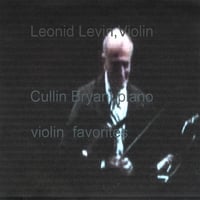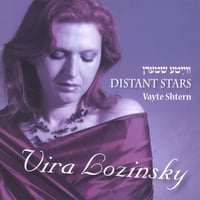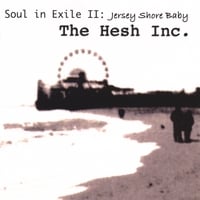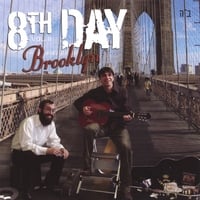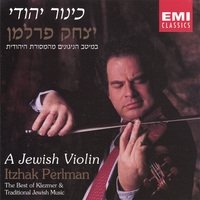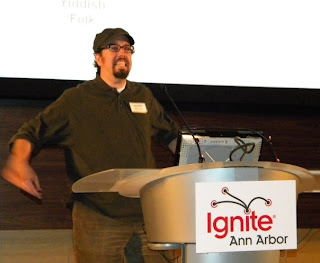Wednesday, September 26, 2007
Fun in my Sukkah...with Elvis
Check out the rest of Billy Ray Sheets videos.
Monday, September 24, 2007
Getting Schooled
"As you may know, I’m in a band of mostly Americans who pretend to be French. So perhaps I shouldn’t be so surprised to think that 30 years ago, there were Israelis in fake Brazilian bands. This album of Brazilian hits of the day [Pais Tropical - Songs From Brazil (1977)], sung in Hebrew, apparently caused quite a frenzy in Israel when it was released. Nationally renowned composer Ehud Manor translated and re-wrote the lyrics (he also wrote the Eurovision winner “A-Ba-Ni-Bi” which I wrote about here); Matti Caspi did the arrangements. Included are songs like “A Felicidade” from Black Orpheus by Antonio Carlos Jobim and the title track by Jorge Ben (originally recorded by Sergio Mendes & Brasil ‘77). Here’s the latter:"
This is serious stuff folks. Go get schooled.
-----
I'm currently on David's page on the "Six Points Fellowship" site. David's put three track samples up that help me understand what he's going for in his own music. When he says indie, he's refering to low volume, introspective, guitar and sequencer driven pop a la The Feelies and The Magnetic Fields. Listening to it gave me flashbacks to hanging out with my buddy Ian in Connecticut in the early 1990's just post-college, with crates of LPs, and him trying turn me into an indie fan. It never quite worked, I could appreciate the understated pop-melodies and how they turned macho rawk-n-roll and bubblegum pop motifs on their heads, but it never connected emotionally for me like it did for him. Or, it would seem, like it does for David. But, these are good recordings that whet my appetite for more. I'm looking forward to see where David goes with his idea of "Jewish indie pop that draws on "Yiddish folks, Zionist and Palestinian national pastiche, and (perhaps scandalously) motifs from Reform and Conservative prayer."
Sunday, September 23, 2007
Hidden Melodies Revealed: The Sway Machine
 I don't usually post about specific events, mainly because there are too many of them. But here's one that I think is important. On September 12, The Sway Machine hit New York with show that I wish I could have seen: Hidden Melodies Revealed. Here's an excerpt from The Sway Machine's website. Read the whole thing here.
I don't usually post about specific events, mainly because there are too many of them. But here's one that I think is important. On September 12, The Sway Machine hit New York with show that I wish I could have seen: Hidden Melodies Revealed. Here's an excerpt from The Sway Machine's website. Read the whole thing here."The Sway Machine is currently at work on a project that seeks to reclaim the deep roots of Ashkenazic Jewish spiritual music. It is my belief that in the work of the master Chazzans of the Golden Age of Cantorial music there is a model for creative work that can be usefully employed today. In the Cantor’s balance of artistic authority and spiritual humility I [Joshua Lockwood] see a perfect stance from which to speak to the emotional needs of the contemporary world. Together with Tomer Tzur, Colin Stetson, Stuart Bogie and Jordan McLean, I am revisiting the work of my heroes of Chazzanus, particularly the music of my grandfather, the legendary Cantor Jacob Konigsberg. In this way I am hoping to return to that place of childlike awe that he opened to me and share it with the world."I'm really interested in this because of deep connection to the cantorial tradition, a Jewish music tradition that doesn't seem to get much attention these days. The liberal Jewish communities (Reform, Conservative, Jewish Renewal, Reconstructionist), and many traditional communities seem to have been moving away from cantorial performer-on-the-pulpit services in favor of participant driven services (whether group singing in liberal communities and rotating davening leadership in traditional communities. As much as I'm a fan of both of these movements I've always loved participating in a service with a good cantor. The power the voice and the very specific musical forms (nusach) used have always inspired me. Sway Machine has always leaned toward cantorial music and I'm glad to see them continue that exploration.
Other than the video below, I haven't heard any of the Hidden Melodies music. I'm a big fan of The Sway Machine and have their EP. Great Stuff. There's a rumor floating around that the event was recorded and that DVD will be available. I tried to order it but couldn't get the Paypal site to work. I'll keep trying. If you're interested check out the Sway Machinery website for more info and contact info.
Sway Machinery Hidden Melodies Revealed 1
Sophie Solomon:
 A couple of weeks ago I ran into the Nu Jewish Music website and had fun looking into some of the groups that I wasn't familiar with (See my post about Israeli guitar and tuba band 'Boom Pam'). I'll post about others later, but today is Sophie Solomon day. Solomon is a fantastic violinist who has played with the British group Oi Va Voi, recorded the wonderful "Solomon & Socalled's HipHopKhasene" with Socalled, and has worked with a wide range of Jewish and non-Jewish performers including Rufus Wainwright, Killing Joke, and Theodore Bikel as well as Gary Lucas, Brave Old World, and The Real Tuesday Weld. (See Solomon's Wikipedia page for a full bio.) Her musical style draws heavily on klezmer, but includes a wide array of classical, jazz, and popular influences as well.
A couple of weeks ago I ran into the Nu Jewish Music website and had fun looking into some of the groups that I wasn't familiar with (See my post about Israeli guitar and tuba band 'Boom Pam'). I'll post about others later, but today is Sophie Solomon day. Solomon is a fantastic violinist who has played with the British group Oi Va Voi, recorded the wonderful "Solomon & Socalled's HipHopKhasene" with Socalled, and has worked with a wide range of Jewish and non-Jewish performers including Rufus Wainwright, Killing Joke, and Theodore Bikel as well as Gary Lucas, Brave Old World, and The Real Tuesday Weld. (See Solomon's Wikipedia page for a full bio.) Her musical style draws heavily on klezmer, but includes a wide array of classical, jazz, and popular influences as well.Solomon released her first solo album, "Poison Sweet Madeira" last year. This concert video, shot and posted by YouTube member "RoughSilk" catches Solomon in Athens in July on tour supporting the album. Great stuff. Give it a listen. You can pick up her album through her website or your favorite music vendor.
Sophie Solomon - Burnt By The Sun (Athens 10/07/2007)
On a side note, I love the voice of the male lead singer but am not sure who it is. The wikipedia page gives credit for male vocals to Richard Hawley and Ralph Fiennes. I think that's Hawley performing here and will try to find out. If so, I'm going to need to look into of his solo work.
Thursday, September 20, 2007
Jewish Music in the New York Times Archive
 As of midnight, September 18th, the New York Times stopped charging for access to its archive. Specifically, the NYT now allows anyone to search the entire archive, which goes back to 1851, for article titles and first paragraphs. The NYT has also allowed free full text access for two portions of its archive, from 1851 to 1922 and from 1987 to the present. They expect to earn more from ad revenue than they are currently earning from subscriptions and article fees. (The NYT explains itself in this article)
As of midnight, September 18th, the New York Times stopped charging for access to its archive. Specifically, the NYT now allows anyone to search the entire archive, which goes back to 1851, for article titles and first paragraphs. The NYT has also allowed free full text access for two portions of its archive, from 1851 to 1922 and from 1987 to the present. They expect to earn more from ad revenue than they are currently earning from subscriptions and article fees. (The NYT explains itself in this article)Across the web, the race for buried treasure is on. Blogs (such as Kottke.org and Deeplinking.net) are digging through the archives looking for articles with historical or cultural significance. I thought I'd join in the fun.
July 16, 1959, Thursday ERNEST BLOCH, 78, COMPOSER, IS DEAD; Creator of 'Schelomo' Wrote in Terms of Jewish Spirit -- Used Bible Themes
April 26, 1908, Sunday CHAMPION CYMBALIST IS PLAYING HERE NOW; Folk Who Know Only Uptown Music May Find Him Down in East Houston Street. THE BARDS POPULAR THERE And the Subjects They Sing -- A New Note Heard in Jewish Minstrelsy
September 15, 1952, Monday TWO SCHOOLS DEDICATED; Cantors Institute and College of Jewish Music Formally Set Up
February 3, 1952, Sunday THE CASE FOR BELIEF THAT JEWISH MUSIC EXISTS Jewish music is as difficult to define as the Jewish people itself. There are those who deny the reality of a Jewish music. They say that what is called Jewish music is really Slavic or Balkan, Babylonian or Egyptian.
December 31, 1935, Tuesday CURBS JEWS IN MUSIC.; Reich Bars Them From Teaching -- Jewish Veterans Evicted.
April 12, 1903, Sunday "COON" SONGS IN YIDDISH AT EAST SIDE MUSIC HALLS; Where the Families of the Crowded Ghetto Find Amusement in the Highland Fling Transformed Into a Yiddish Dance and in the Strains of "Upidee."
If you want to do your own digging, go to the NYT home page, enter your query in the search box, and set the dropdown to "NYT Archive 1851 to 1987"
Mail Bag: Chassidic Metal, Punk Unplugged, Aires de Sefarad, and some CD Reviews
-----
Teihu - Chassidic Metal Band
I saw your blog about The 8th Day, and thought you might want to
check out Teihu.
See teihu.com and myspace.com/teihu
Teihu has won first place in the Battle of the Bands (first round) in
the Pittsburgh area, and will be competing in the Finals next Sunday.
(I passed this email on to Keith at Metal Jew and he wrote a good post about Teihu. Check it out.)
The Shondes - A Benefit for Birthright Unplugged*
Saturday, September 29th, Doors at 7:00! Show promptly at 8:00!
$10 suggested or pay-what-you-can. Delectable rock 'n roll, beer, pizza and dancing - and all to support the work of an important organization!
FEATURING Mystery Family (myspace.com/mysteryfamilymusic), The Shondes(www.shondes.com), Looker (www.lookernyc.com), +DJ and dancing!
Free beer with any pizza order from 7:00 - 8:00 - come early!
-----
*Birthright Unplugged is an education and movement-building project that challenges the concept of a Jewish birthright to a land that Palestinian people were displaced from, and supports Palestinian people's rights to this land. For more information, visit www.birthrightunplugged.org
For more show information visit www.theluckycat.com or www.shondes.com. New interviews with The Shondes now out in Curve, Punk Planet and Venuszine.com
(Just to be clear: I dig the Shondes music, and posted about them back in June. I welcome bands with strong political views and will post about them without comment on whether I personally agree with those views. This isn't apathetic objectivism. I just like seeing applecarts, even my own, get overturned. I learn more that way.)
CD-Aires de Sefarad
Surfed into your website and remembered you are interested in recordings of Jewish music but,i couldn't remember if i made you aware of Albany Records 2007 Grammy Entry "Ares de Sefarad". It is a cycle of 46 works written by Jorge Liderman for my daughter and son in law-Duo46 and based on 500 year old Sephardic music.
If not,you can hear the music by visiting website -Duo46 www.duo46.com
Recent CD Reviews
Hi Jack, I've posted two CD reviews on my Blog that may be of interest. Thanks. http://blog.myspace.com
Tuesday, September 18, 2007
Third International Festival of New Jewish Liturgical Music
 "In each of the three instances, the shalshelet denotes a clash of deep emotions, hesitation and anxiety." Rabbi Bernard L. Berzon
"In each of the three instances, the shalshelet denotes a clash of deep emotions, hesitation and anxiety." Rabbi Bernard L. BerzonI was chatting with Keith from the KlezmerPodcast last night. He wanted to me to know that he had cleaned up the mess that iTunes had made of his podcast feed. If you haven't gotten his most recent podcasts, go resubscribe and you'll get them. And while you're there, subscribe to his
I'd love to go KlezKamp or KlezKanada some time, and maybe I will. But what I'm really excited about, and may actually attend, is the Third International Festival of New Jewish Liturgical Music June 13 to 16, 2008 in Milwaukee Wisconsin. The sponsoring group, Shaleshet, the Foundation for New Jewish Liturgical Music, describes themselves as
"continu[ing] an ancient chain of tradition that honors the role of music in interpreting sacred texts. Shalshelet seeks to foster the creation of original music and to expose wider audiences to innovations in Jewish religious music. Shalshelet’s mission is to use music to build bridges both within and outside the Jewish community. Shalshelet’s participants are drawn from across all Jewish denominations - Reform, Conservative, modern Orthodox, Reconstructionist, Havurah, affiliated, and unaffiliated."The Festival of New Jewish Liturgical Music showcases a competition for new settings of Jewish texts and where selected compositions are performed in concert. In the past, compositions have included "cantorial, congregational, and choral pieces in styles as diverse as Chassidic, jazz, classical, and international pop music." In addition to the music, the Festival has workshops that "bring artists and other professionals together with the public for discussion of the creative process and musical approaches to text". If you're a composer (or want to try your hand at composing), the deadline for submitting is November 1, 2007.
I hope that I can get my work and home life to line up so that I can go. Wisconsin isn't all that long a drive from up here on the North Coast and spending a weekend with a bunch of folks who are serious about Jewish liturgy sounds like a blast to me.
By the way, thinking of my post about cantillation the other day, I thought I'd mention where the name 'Shalshelet' comes from. From their website...
The shalshelet cantillation symbol (Hebrew for "chain") is one of the rarest in the system of melodic motifs for chanting the books of the Torah aloud. Found only four times in the Five Books of Moses, each time it guides the chanting of a verb at a pivotal moment in the narrative.See Rabbi Berzon's sermon on Vayeshev for a longer, richer description.
Monday, September 17, 2007
Bas Sheva
 Somewhere out there is a land where Tiki bars still serve Mai Tai's at sunset against the backdrop of Martin Denny drum beats and tropic bird calls. One such exotic bird was Beatrice Kurzman, aka Bas Sheva. According to "Uncle Dave Lewis, All Music Guide," Bas Sheva was
Somewhere out there is a land where Tiki bars still serve Mai Tai's at sunset against the backdrop of Martin Denny drum beats and tropic bird calls. One such exotic bird was Beatrice Kurzman, aka Bas Sheva. According to "Uncle Dave Lewis, All Music Guide," Bas Sheva was"born to a wealthy and prominent Jewish family in Philadelphia. When Kurzman decided to go into show business she adopted the name "Bas Sheva" (i.e., the Biblical "Bathsheba") in order not to embarrass her family....and probably got her start singing in the socalled "Borscht Belt" of Catskill Mountains resorts.I love finding treasures like Bas Sheva. She was a talented performer who produced some amazing Jewish and non-Jewish material. It's sad to imagine what she might have accomplished if she'd lived longer.
In 1953 Bas Sheva was engaged by bandleader Hal Mooney as the principal voice on Soul of a People, a collection of traditional Jewish songs issued by Capitol. This was a very successful disc in the Jewish market, and Bas Sheva's brassy, no holds barred delivery of this familiar material was an important element in making Soul of a People appealing....Bas Sheva's performance on The Passions is quite amazing even 50 years on; she screams, wails, whimpers, howls, grunts, and even acts a little to the pulsating rhythms of Baxter's dark, gritty, and complex musical score...
In 1960 Bas Sheva died at age 34 from a diabetic reaction suffered while entertaining on board a cruise ship."
Bas Sheva - Jealousy
Thanks to
Mordechai Ben David & YM Gerstner - Chabad Telethon
Chaim points out that the concert was, in fact, a telethon. If you want to make a donation, go to ToLife.com.
Mordechai Ben David & YM Gerstner - Chabad Telethon
This video was taken down and reposted. Sorry if anyone had any issues with it. Thank's again to Chaim for posting (and reposting) it.
Sunday, September 16, 2007
Music of the Bible Revealed!
Ok. That was a bit melodramatic and might be a bit unfair to Suzanne Haïk-Vantoura, the French Jewish musical theorist and author, but not at all unfair to John Wheeler (aka Johanan Rakkav) the American editor of "Music of the Bible Revealed". The shrill tone of the title and Wheeler's website just brings out my bad side. (I've always been at the intersection of alt-science, alt-political, alt-religion, and alt-health crowds. I can always smell a rat.)
Anyway, what's revealed in this book, and in a series of related recordings, is something much more esoteric and much less exciting than spaceships or the holy grail: the original meaning of the te`amim, Torah cantillation, or trope, marks. Cantillation is the ritual chanting of Torah (Bible) passages and cantillation marks are small accent marks above or below the Hebrew text that guides cantor's (or Hazzan's) musical performance. The following image (from the Wikipedia cantillation article) shows the Hebrew text from Genesis 1:9 "And God said, "Let the waters be parted" with vowels and dageshim (letter doublings) in red and accent marks in blue.
 The "meaning" of the accent marks that (the Jewish) Haïk-Vantoura discovered is a manner of musically interpreting these marks which she claims is the correct original interpretation. This is important, in her view (or is it Wheeler's) view, because over the millenia the various Jewish interpretations of these marks have degenerated leaving us with a shadow of the original musical forms. Wheeler (a Christian) goes farther saying that "the musical results of Haïk-Vantoura's [research are] nothing less than awe-inspiring...Is is possible that we are hearing the word of the Lord in the actual melody He inspired by the Holy Spirit?"(Emphasis and Christianisms in the original) If you're interested in the details of Haïk-Vantoura's revelation then check out Wheeler's website, he explains in detail.
The "meaning" of the accent marks that (the Jewish) Haïk-Vantoura discovered is a manner of musically interpreting these marks which she claims is the correct original interpretation. This is important, in her view (or is it Wheeler's) view, because over the millenia the various Jewish interpretations of these marks have degenerated leaving us with a shadow of the original musical forms. Wheeler (a Christian) goes farther saying that "the musical results of Haïk-Vantoura's [research are] nothing less than awe-inspiring...Is is possible that we are hearing the word of the Lord in the actual melody He inspired by the Holy Spirit?"(Emphasis and Christianisms in the original) If you're interested in the details of Haïk-Vantoura's revelation then check out Wheeler's website, he explains in detail.Whew. I knew there was a conspiracy here somewhere. Wheeler, through careful analysis of the revelation, draws out a whole series of lessons to guide Christian music and indulges in a strange discussion of contemporary Christian music that I don't follow at all. The bottom line "But as we must translate the Hebrew, Aramaic and Greek words of the Hebrew-Christian Bible into many different languages, so we must translate the musical principles of the Bible into terms that cross all boundaries of time and place." Right. You do that.
Anyway, the study of cantillation and cantillation marks is an old and venerable one. There is a nice article on it in the 100 year old Jewish Encyclopedia, as well as more current but not much different article on Wikipedia. This isn't to say that no progress has been made in the last 100 years, but I'm not aware of anything really significant coming out of the academic study. (sigh, as a scientist I'm allowed to say it...how much ever really does?). I would love to know what the academic community thinks about Haïk-Vantoura's work, but I haven't been able to find a review yet.
And now the moment you've been waiting for...The Music of the Bible Revealed!
The Music of the Bible Revealed - Esther 5:1-3
Saturday, September 15, 2007
Rosh Hasanah II: The Shofar - Music and Memory
 I hate not being able to answer simple questions. And since my Jewish education is on par with most liberal American Jews (meaning pretty poor), I find myself stuck on simple Jewish questions all the time. This week's question: what's the connection between Rosh Hashanah and blowing the Shofar? Since Rosh Hashanah and Shabbat are good study times I decided to hit the books to try to find an answer. Here's what I found.
I hate not being able to answer simple questions. And since my Jewish education is on par with most liberal American Jews (meaning pretty poor), I find myself stuck on simple Jewish questions all the time. This week's question: what's the connection between Rosh Hashanah and blowing the Shofar? Since Rosh Hashanah and Shabbat are good study times I decided to hit the books to try to find an answer. Here's what I found.First, the requirement to observe Rosh Hashanah, and to incorporate the Shofar into its observance, is a divine one originating in Vayikra (Leviticus) 23:23-24
"And HaShem spoke unto Moses, saying: Speak unto the children of Israel, saying: In the seventh month, in the first day of the month, shall be a solemn rest unto you, a memorial proclaimed with the blast of horns, a holy convocation. Ye shall do no manner of servile work; and ye shall bring an offering made by fire unto HaShem".Second, the Torah portion for Rosh Hashanah (Gen 21:1-34) describes (among other things) the birth of Isaac to Abraham and Sarah. This connection of Rosh Hashanah to Isaac connects the holiday to one of the most pivotal moments in Genesis: the Akedah (the binding of Isaac). It's the story of the Akedah that provides (at least one) connection between Rosh Hashana and the Shofar. (Why the Akedah itself is not the Torah Portion for Rosh Hashanah is a good question and has been the subject of lots of discussion and many sermons. See Torah.Org for one example.)
(See the Jewish Virtual Library or your Chumash or Tanakh of choice)
While I can't claim any real experience studying Talmud, I have a copy of Bialik and Ravnitzky's "Sefer Ha-Aggadah - The Book of Legends: Legends from the Talmud and Midrash." Sefer-Ha-Aggadah provides this explanation from the early Midrash, attributed to Reb Yohanan, citing Reb Yose ben Zimra (from the Tanhuma Midrash, I think.):
Abraham: "When You (Hashem) commanded me to sacrifice Isaac, I should have replied: Yesterday You told me, 'In Isaac shall th seed be called' [Gen 21:12]; Now you say to me, 'Offer him there for a burnt offering' [Gen 22:2]. Nevertheless, I restrained my impulse and did not reply as I should have done. Even so now [I say to You], When Isaac's children shall sin and find themselves in distress, be You mindful on their behalf of the binding of Isaac; let it be reckoned in Your presence as though his ash were in fact heaped upon the alter - be then filled with compassion for his children, forgive them, and redeem them from their distress." The Holy One replied, "You had your say, and now I will have Mine. Isaac's descendants will sin in My very presence, and I will have to judge them on New Year's Day. However, should they implore Me to seek out some merit on their behalf, and to remember on their behalf the binding of Isaac, let them blow in My presence the horn of this creature." Abraham: "The horn of what creature?" God: "Turn around." At once "Abraham lifted up his eyes, and looked, and behold a ram" [Gen. 22:13).And there it is...on Rosh Hashanah we blow the ram's horn to implore God to remember the merit of Isaac and Abraham, and to remind ourselves of their merit. (And to inspire us to live up to it.) We play the music of the shofar to remember.
---------------
After writing the above I found this description in the online Jewish Enclyopedia (1906):
The "teḳi'ah" and "teru'ah" mentioned in the Bible were respectively bass and treble. The teḳi'ah was "a plain deep sound ending abruptly; the teru'ah, a trill between two teḳi'ahs. These three sounds, constituting a bar of music, were rendered three times: first in honor of theocracy, or "malkiyot" (kingdom); then to recall the 'Aḳedah and to cause the congregation to be remembered before God, or "zikronot" (remembrances); a third time to comply with the precept regarding the shofar. Ten appropriate verses from the Bible were recited at each repetition, which ended with a benediction (R. H. 16a). Doubt, however, arose as to the sound of the teru'ah. Onḳelos translates "teru'ah" as "yabbaba"; but the Talmud is uncertain whether it means an outcry ("yelalah") or a moaning ("geniḥah") sound. The former was supposed to be composed of three connected short sounds; the latter, of nine very short notes divided into three disconnected or broken sounds ("shebarim"). The duration of the teru'ah is equal to that of the shebarim; and the teḳi'ah is half the length of either (R. H. iv. 9). This doubt as to the nature of the real teru'ah, whether it was simply an outcry or a moan, or both, necessitated two repetitions to make sure of securing the correct sound, the following formula, consisting of ten sounds, resulting: teḳi'ah, shebarim-teru'ah, teḳi'ah; teḳi'ah, shebarim, teḳi'ah; teḳi'ah, teru'ah, teḳi'ah. This formula was repeated twice, making thirty sounds for the series. The last teḳi'ah was prolonged and was called "teḳi'ah gedolah" = the "long teḳi'ah." This series of thirty sounds was repeated twice, making ninety sounds in all. The trebling of the series was based on the mention of teru'ah three times in connection with the seventh month (Lev. xxiii. 24, xxv. 9; Num. xxix. 1), and also on the above-mentioned division into malkiyot, zikronot, and shofarot. In addition a single formula of ten sounds is rendered at the close of the service, making a total of 100 sounds. Thus the original three sounds, constituting a musical bar, were increased to 100 at the New-Year's Day ceremony.
Wednesday, September 12, 2007
Rosh Hashanah I: Unetanah Tokef - Who By Fire?
---
Unetanah Tokef is one of the the central piyyut of Rosh Hashanah. It presents us before God, the merciful judge, on this "awesome and terrible day," asking what each of our fates will be and asking that "repentance, prayer and righteousness avert the severe decree." Because of it's apocalyptic tone and vision, the Unetanah Tokef has always been a source for Jewish legends and poetry. (MyJewishLearning.com presents a wonderful legend about Rabbi Amnon of Mainz as one example).
Here is the full text (from MyJewishLearning.com) followed by the contemporary musician and poet Leonard Cohen performing his "Who By Fire."
We shall ascribe holiness to this day.
For it is awesome and terrible.
Your kingship is exalted upon it.
Your throne is established in mercy.
You are enthroned upon it in truth.
In truth You are the judge,
The exhorter, the all‑knowing, the witness,
He who inscribes and seals,
Remembering all that is forgotten.
You open the book of remembrance
Which proclaims itself,
And the seal of each person is there.
The great shofar is sounded,
A still small voice is heard.
The angels are dismayed,
They are seized by fear and trembling
As they proclaim: Behold the Day of Judgment!
For all the hosts of heaven are brought for judgment.
They shall not be guiltless in Your eyes
And all creatures shall parade before You as a troop.
As a shepherd herds his flock,
Causing his sheep to pass beneath his staff,
So do You cause to pass, count, and record,
Visiting the souls of all living,
Decreeing the length of their days,
Inscribing their judgment.
On Rosh Hashanah it is inscribed,
And on Yom Kippur it is sealed.
How many shall pass away and how many shall be born,
Who shall live and who shall die,
Who shall reach the end of his days and who shall not,
Who shall perish by water and who by fire,
Who by sword and who by wild beast,
Who by famine and who by thirst,
Who by earthquake and who by plague,
Who by strangulation and who by stoning,
Who shall have rest and who shall wander,
Who shall be at peace and who shall be pursued,
Who shall be at rest and who shall be tormented,
Who shall be exalted and who shall be brought low,
Who shall become rich and who shall be impoverished.
But repentance, prayer and righteousness avert the severe decree.
Leonard Cohen - Who By Fire
Tuesday, September 11, 2007
The People's Republic of Klezmerica
"Hillbilly music in America has its parallels with hillbilly music in Eastern Europe, though there are few direct links between the two. Klezmer is Jewish dance music interweaving melodies and modes brought up from Israel with the music of surrounding Polish, Greek, Romanian, Ukrainian and Gypsy cultures. The People’s Republic of Klezmerica is a young, acoustic sextet from Columbia, Mo. whose energy brings a raw edge to the style, infusing it with their own sense of Jewish-Hillbilly exuberance from the Ozark borderlands."
Klezmer Music at Cooper's Landing / OzarKlezmer
Rosh Hashana Urbano
Anyway, here's Rosh Hashana Urbano promo video put out by the event sponsor, YokTime. I can't wait to show my elder wiggler. She and I love to watch Rube Goldberg machine videos and she'll flip out to see a Jewish one. I'm not sure where the music for the video comes from. It reminds me of a British pop tune used in particularly annoying hair products commercial.
ROSH HASHANÁ URBANO 2007
Here are videos of some the bands that took part.
Segundo Mundo. Música Klezmer
Tandarika
Guiborim - Jewish Rock
Other groups that took part include "The Shabbatones" (a Ska group, not the UPenn singing group), The Klezmer Brass Band, Hiperimpulso, Simja Dujov & The Strudel Klezmer band, and the Dúo Guefilte Fish.
I got the link to the newspaper article from the blog "Trendy Palermo Viejo", the "First trilingual blog about shops, restaurants, hotels, places & events of Palermo Viejo, the trendiest neighborhood of Buenos Aires, Argentina." Thanks Nancy!
Monday, September 10, 2007
Leonard Cohen singing WWII French Resistance song "The Partisan"
"Jeramayakovka has unearthed a phenomenal video of Leonard Cohen performing "The Partisan," a song about survival behind nazi lines. He includes information on the background musicians and the lyrics."
Here's the video, but definitely check out Jeremayakovka for the background info.
Leonard Cohen The Partisan
Saturday, September 8, 2007
Sophie Tucker and Bette Midler, Last of the Red Hot Mamas
 "I will never forget it you know. I was in bed one night with my boyfriend Ernie and he said to me, "Soph, how come you never tell me when you're having an orgasm?" I said to him, 'Ernie, you're never around!'"
"I will never forget it you know. I was in bed one night with my boyfriend Ernie and he said to me, "Soph, how come you never tell me when you're having an orgasm?" I said to him, 'Ernie, you're never around!'"There's this idea that's been floating around for a long while now that women are demure little creatures that blush, flush, and bat their eyes. And while I've met one or two that seemed to fit that description, I've known a lot more women who could laugh, sweat, cuss, and look me in the eye while doing it. I'd give names, but the list is too long and you know who you are anyway.
That's why I'm smitten with Sophie Tucker, Last of the Red Hot Mamas. Born Sophie Kalish in Russia in 1884, she emigrated with her Jewish family to Hartford, Connecticut (my home turf). She took off to New York in 1906 to break into show business, singing in vaudeville clubs, cafes and beer gardens. Her songs, including 'A Good Man Is Hard to Find," "I'm Living Alone and I Like It," "I Ain't Takin' Orders from No One," and "No Man is Ever Gonna Worry Me" were full of raunchy, tell-it-like-it-is humor. She was fat, Jewish, sexy, and proud. And if you didn't agree, get out. She also could deliver poignant, emotional, performances in the form of her signature tunes "Some of These Days" and "Yiddishe Momme." Her career ran over 50 year with recorded output ranging from wax-cylinders through taped color television performances. She's inspired generations of female singers and comediennes including, Bette Midler, the Divine Mrs. M.
Sophie Tucker, No One But The Right Man Can Do Me Wrong
Bette Midler was born in 1945 to a Jewish family in Hawaii got her big break joining the Broadway chorus of Fiddler on the Roof in 1966 and then getting the leading role of Tzeitel. Along the way Midler performed movies, TV shows, Broadway musicals, comedy shows, and for a while had a fifty dollar a night job singing to male homosexuals at the Continental Baths in New York. Like Tucker, Midler brings (she's still going strong) a frank humor and sexuality to her performances. Midler explicitly refers to Tucker in her stage shows through her character 'Sophie Tucker.' 'Soph' jokes draw and exaggerate Tucker's vocal style and risque humor to great effect. (They're hilarious)
Bette Midler "Pretty Legs" From the Arsenio Hall Show 1991
Ok, now that we've gotten all of that out of the way, here's Bette peforming "Soph" jokes on the Arsenio Hall show in 1991. Warning. These are raunchy and hilarious.
The Arsenio Show- Sophie Tucker
Here's another 'Soph Joke' video. And another one.
Unfortunately, I'm not aware of any of Midler's comedy shows with 'Soph' jokes being available on DVD or VHS, but two of them are available on CD. Amazon has "Live At Last" and "Mud Will Be Flung Tonight". A dedicated Mrs. M fan has posted all of the "Soph" jokes.
There are lots of online resources dedicated to Sophie Tucker, including a Wikipedia page, The Jewish Women's Center 'Jewish Women in Comedy' page, and "Sophie Tucker’s Visit to the Barbary Coast" and "Sophie Tucker and “Some of These Days”" at the Virtual Museum of the City of San Francisco. A number of Tucker compilation albums are still in print and available.
One last note. Writing this post has gotten me a bit nostalgic thinking of my Grandpa Harry, who passed away over twenty years ago. He had a large record collection that I, a budding music fan, admired the breadth of but didn't relate the content of. While he would have been about 30 years younger than Tucker, I'll bet he knew her music well. It would have been nice to talk to him about it.
Friday, September 7, 2007
8th Day's new album is out
To tide me over, here's a 10 minute montage from their CD Release Party at the Carlebach Shul.
8th Day @ The Carlebach Shul - 8/28/08
and another montage from the 2007 Maccabi Games. (Sent to me by Sam. Thanks!)
8TH DAY
Thursday, September 6, 2007
Staying on top of new frum music
One reason I didn't get to Michoel Pruzansky, Yishai Lapidot and the some of the other frum performers with new albums is that I find it very hard to get information about them. Curiously, many frum musicians don't maintain any public web presence, whether via a record label site, a performer homepage, or a myspace page. On top of that the regular sources of info I have, including JE Magazine, the JewishMusicReview blog, JewishJukebox, and Mostly Music, are good about announcing new albums but not so good about describing them in the manner I'm used to.
What I'm used to is a band (or record label) assuming that they need to be positioned relative to a wide range of possible genre's and competing sounds. Here are a few typical examples from my most recent 'Recent and Upcoming Albums' post.
- "Virtuoso classical violin showcasing classical masterpieces. Romantic violin with soul added to each note" - Leonid Levin
- "Vira’s mellifluous alto voice is powerful, warm, expressive, and pure. Her unique repertoire includes new material written especially for her, as well as Yiddish folk songs, songs of Bessarabian, Romanian and Polish Jewish poets, and of classical and modern Yiddish poets..." Vira Lozinsky
- "an allstar Latino-Jewish urban music collective"- Hip Hop Hoodios
- "mixes pop, rock, fund and RandB with Jewish themes that are particularly relevant today" - Blue Fringe
- "The group blends Hip-Hop beats and traditional Jewish Melodies to make a sound that’s fresh and all their own." - Ta-Shma
- "After the tremendous success of his debut album “Legabay”, Dovid Gabay is back at it again. Under the Production of Avi Newmark Gabay’s second album is well underway. The album features compositions by Jewish music’s elite. Yossi Green, Yitzy Waldner, Boruch Levine, Avi Kula, and Elimelech Blumestein. Joining in on Gabay 2 as arrangers are Yisroel Lamm, Leib Yaacov Rigler, Avremi Gourarie, and Yonatan Razel." - Dovid Gabay
- "This dynamite album featuring a few songs by by Yitzy Bald, as well as being its producer and arranger is already creating quite a buzz." - Michoel Pruzansky
Second, and this is the part that reminds me of jazz, once you get past the (more or less useless) descriptive prose, it's the strength of the people involved in the album that matter. Lots of jazz writing used assume that everyone was basically playing bop, or post-bop, so describing jazz was pointless. But noting that a talented keyboard player had sat in for the recording was interesting. The challenge with that approach though is it makes the writing (and, to a degree, the music) more insular and risk-adverse. Albums with known names are likely to be better because of the known names. If you're an insider who knows the names. And if these names really do as good a job on this album as they did in the past. And if the new kids really can't measure up.
Anyway, this is all just me thinking out loud and probably (as usual) showing off my ignorance. It's also a long way of saying that I still haven't done a good job including frum albums in my 'Recent and Upcoming Albums' post. If anyone from the frum communities wants to set me straight I'd appreciate it.
I just reread this post and realized I forgot to mention that there are other ways than print/web media that the frum communities (and all music communities) use to help fans find out about music. The most obvious are word of mouth, listening to music in stores, and listening to music on the radio/internet. These all have an important role. In this post I was just thinking about the print/web issues that were giving me a hard time.
Wednesday, September 5, 2007
Recent and Upcoming Albums
Leonid Levin releases "Violin Favorites" available through CDBaby.
"Virtuoso classical violin showcasing classical masterpieces. Romantic violin with soul added to each note. It features "Nigun"The Leonid (Leib) Levin Jazz Quartet releases "From Nigun To Klezmer" available through PayPlay.fm.
by Ernest Bloch (Movement from Baal Shem Tov suite)"
"Award-winning Violinist Leib Levin accompanied by outstanding Jazz Trio (Garry Gregory-piano, Martin Confurius-bass, Nodar Rode-drumms) and by renowned pianist Yaron Gershovskiy (track3&7) in presentation of Jewish Folk, Pop, Classical and Religious Melodies"
Vira Lozinsky releases "Distant Stars - Vayte Shtern" available through CDBaby.
"Vira Lozinsky is a leading voice among a new generation of singers cultivating Yiddish culture in Israel...An enchanting performer in every way, Vira’s mellifluous alto voice is powerful, warm, expressive, and pure. Her unique repertoire includes new material written especially for her, as well as Yiddish folk songs, songs of Bessarabian, Romanian and Polish Jewish poets, and of classical and modern Yiddish poets like I.Manger, Z.Berdichever, M. Gebirtig, A.Greenblat, M.Felsenbaum"
Temple releases "Coming Home" available through Sounds True.
"Love resonates from each note of the long-awaited musical collaboration of American singer Danya Uriel and Israeli guitarist Eyal Rivlin, the duo known as Temple. The alchemical fusion of Uriel's angelic soprano and Rivlin's hypnotic instrumentation results in Coming Home, a collection of original Hebrew chants that honor the sacred and foster inner healing and inspiration."Sounds True sent me a review copy back in July when I posted about Temple. I'll admit that Coming Home is a bit dreamy a recording for me. I'm not often in the mood for letting go of myself in the way this album demands. But when I am, Coming Home is pretty spot on. Here's a strange analogy. I hate the taste of Gatorade. Except when I'm really, really hot and thirsty. And then it is the most delicious thing in the world. Something like that.
Hip Hop Hoodios releases "VIVA LA GUANTANAMERA" available through iTunes and eMusic.
"Hip Hop Hoodios (“hoodio” is a twist on the word “judio” – Spanish for “Jew”) is an allstar Latino-Jewish urban music collective led by Josué Noriega and Abraham Veléz that includes participation from members of such notable Latin & Jewish acts as Santana, Jaguares, The Klezmatics, Orixa, Los Mocosos, Midnight Minyan, and Los Abandoned. The Jewish answer to El Gran Silencio? The Latino respuesta to the Beastie Boys? Put the categorizations aside – Hip Hop Hoodios are out to change the notions and preconceptions of Latin and Jewish music. From Latin funk to klezmer to cumbia to straight-up hip-hop, Los Hoodios are cross-cultural mayhem at its best."This second full length album for the "Latino-Jewish Urban Music Collective." And while it's only available for download, it's already getting a lot of attention. It's title track was anointed 'track of the day' by the taste-makers at KCRW in LA and it debuted 18 on the iTunes top Latino album charts in early August. Great stuff. See my earlier post for more.
The Hesh Inc. releases "Soul In Exile II" available through CDBaby
"Soul In Exile 2: Jersey Shore Baby is a lyrically-intense, semi-autobiographical, musical travelogue, telling its story by using local and regional references as metaphors for universal experiences including love, loss, isolation, redemption, and finding one's place in the world. In November 1978, an awkward, geeky, and gangly Orthodox Jewish kid from Long Beach, NY named Heshy Rosenwasser dropped a quarter into a lucky charm imprinting machine at Lee's Arcade in Convention Hall on the Asbury Park boardwalk. Fueled by the onset of adolescent hormones and a nascent love of rock'n'roll music, spurred by a flash of inspiration from a "cool" character then in the American pop-culture consciousness, eight quick strokes of the lever brought on Heshy's ugly-duckling reinvention as The Hesh, and from that point on life was never the same. The meaning of life, as expounded by rabbis and historical religious figures, became compounded by the sound of the beach poets and boardwalk prophets of Jersey Shore rock'n'roll, which astounded and confounded his parents and peers to no end."
Tenor Saxophonist Seth Kibel releases "The Great Pretender" available through iTunes and Amazon.
"In his first solo album, The Great Pretender, tenor saxophonist Seth Kibel brings his raucous, blues-drenched sound to 10 songs with support from some of the most skilled artists in the Mid-Atlantic and beyond. The album’s blues and roots rock sounds represent a new approach for the versatile performer and composer, known for his jazz and klezmer music and his leadership of the award-winning “alternative klezmer” band The Alexandria Kleztet."
Lawrence Dermer releases "Third House Rising".
"Third House Rising is a Musical Jewish Journey – a collection of music and lyrics that push the boundaries of both music and Jewish in a way that expands the mind, soothes the heart and lifts the soul. The compositions reflect Lawrence’s strong Jewish heritage and embrace his contemporary musical genius. Robin’s lyrics are a unique and inspired reflection of Jewish stories, thoughts and values throughout history from the time of the First Temple through the 21st Century. Together, the music and lyrics bring light into the world by reaching into the hearts and souls listeners. As the Jewish people have traveled, settled and flourished throughout the world and still retain their unity as one people, so do the various musical compositions in Third House Rising bring the sounds of the world together as one. Lawrence’s signature blend of music comprised of Middle Eastern, R & B, Pop, Latin and World Rhythms is neatly sewn throughout the tapestry of Third House Rising."Geoff Berner releases "The Wedding Dance of the Widow Bride" available through Jericho Beach.
" 'I want to drag klezmer music kicking and screaming back into the bars.' That's the goal of Vancouver singer-songwriter-accordion player Geoff Berner... "I want to make original klezmer music that's drunk, dirty, political and passionate. As a Jew of eastern european descent, I feel I have a calling to make this music live, not just preserve it under glass like something in a museum." Geoff has undertaken numerous international tours, festival appearances, airplay on national radio, and opening slots on tour with artists such as Billy Bragg, Corb Lund, Po' Girl, Kaizers Orchestra, Carolyn Mark and the Be Good Tanyas (who covered his song 'Light Enough to Travel'). He's garnered critical acclaim and a cult following for his sharp songwriting and cabaret performance style, especially in Canada, England and Scandinavia."8th Day releases "Brooklyn" available through CDBaby.
"New blend of Chassidic rock, blues and klezmer. The latest from the hottest sound in Jewish Music. From the shtetl to modern day "Brooklyn", this is a journey you will not soon forget"I've got 8th Day's previous album and am pretty fond of it. I'm looking forward to checking this one out. You can catch a Nachum Segal of 'JM in the AM' interview with band and a video of their CD release party.
Itzhak Perlman releases "A Jewish Violin - The Best of Klezmer & Traditional Jewish Music" available through CDBaby.
"Itzhak Perlman performs classic Jewish melodies on this imported CD with some of the greatest Klezmer bands in the world as well as the Israel Philharmnic Orch. his imported CD, available in limited quantities, consists of selections from various albums Itzhak Perlman has recorded of Jewish music, ranging from traditional Yiddish tunes, to Klezmer, and the Classics. In this compilation, Perlman is joined on various selections by The Klezmatics, The Brave Old World, The Andy Statman Klezmer Orchestra, The Israeli Philharmonic Orchestra,and pianist Janet Goodman Guggenheim. Included in this collection, are two selections Perlman performed in the film, "Schindler's List" with John Willimans conducting. This exceptional album has never been released in the USA."
It's 1 AM North Coast Time and I need to give it a rest. I'm aware of at least 10 more albums that I should be listing, including 'The ZAMIR CHORALE OF BOSTON: Psalmsensation', 'AHAVA: By the Power of You: Inspirations', 'UZI ESSNER: Voices of The Bible,' 'SHEVET ACHIM FAMILY ENSEMBLE: Jewish Family Ensemble-Neshama Yeteira', as well as new albums from Michoel Pruzanskys, Akiva Margaliot, Yishay Lapidot, Sam Glasers, and The New Project Relax Sampler. Whew. Sorry to anyone I've missed. Send me an email and I'll make sure I get you in the next round.
A little more bookishness
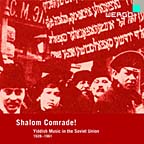 "The extended booklet text to the CD Shalom Comrade!: Yiddish Music in the Soviet Union 1928-1961 ... by Rita Ottens and [Joel Rubin] is finally available ...[It] includes a lengthier essay in English and Russian, a shorter version of same in German, plus complete song texts in Yiddish and transliterated Yiddish with English translations." You can download the booklet from www.rubin-ottens.com/shalom_comrade.pdf. You can pick up the recording through your favorite music retailer (such as Amazon.)
"The extended booklet text to the CD Shalom Comrade!: Yiddish Music in the Soviet Union 1928-1961 ... by Rita Ottens and [Joel Rubin] is finally available ...[It] includes a lengthier essay in English and Russian, a shorter version of same in German, plus complete song texts in Yiddish and transliterated Yiddish with English translations." You can download the booklet from www.rubin-ottens.com/shalom_comrade.pdf. You can pick up the recording through your favorite music retailer (such as Amazon.)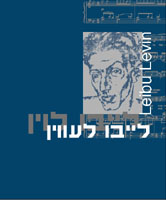 "Leibu Levin. Word and Melody", published by I.L. Peretz Publications. "Leibu Levin (1914–1983), called Yiddish Schubert, the late Czernowitz born Yiddish actor, singer and composer, was a real troubadour of Yiddish literature. Levin's compositions have been sung also by other Yiddish singers, but until now, there was no anthology of his work. The anthology contains 49 songs to poems by 21 Yiddish poets (I. Manger, H. Leivick, H. N. Bialik, M.-L. Halpern, Sh. Halkin and others), photos and drawings. Ruth Levin, the composer's daughter and renowned singer, provides a preface and an epilogue. The volume includes piano arrangements by Hanan Winternitz." The Anthology can be ordered from OR-TAV Music Publications.
"Leibu Levin. Word and Melody", published by I.L. Peretz Publications. "Leibu Levin (1914–1983), called Yiddish Schubert, the late Czernowitz born Yiddish actor, singer and composer, was a real troubadour of Yiddish literature. Levin's compositions have been sung also by other Yiddish singers, but until now, there was no anthology of his work. The anthology contains 49 songs to poems by 21 Yiddish poets (I. Manger, H. Leivick, H. N. Bialik, M.-L. Halpern, Sh. Halkin and others), photos and drawings. Ruth Levin, the composer's daughter and renowned singer, provides a preface and an epilogue. The volume includes piano arrangements by Hanan Winternitz." The Anthology can be ordered from OR-TAV Music Publications.
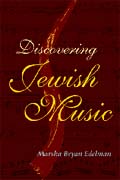 Discovering Jewish Music is now out in paperback. "Most of us have experienced "Jewish music," whether it's through synagogue attendance, a bar mitzvah celebration, a klezmer concert, or the playing of "Hava Nagila" at a baseball
Discovering Jewish Music is now out in paperback. "Most of us have experienced "Jewish music," whether it's through synagogue attendance, a bar mitzvah celebration, a klezmer concert, or the playing of "Hava Nagila" at a baseball
game. The many different kinds of Jewish music are reflected by the multitude of Jewish communities throughout the world, each having its own unique set of experiences and values. This book puts the music into a context of Jewish history, philosophy, and sociology. Edelman begins 3,000 years ago, with a discussion of music in the Bible, and then examines the nature of folk and liturgical music in the three major Diaspora communities that evolved over centuries, after the destruction of the Temple in Jerusalem. From there she explores music of the 20th century, including the explosion of popular music in North America and Israel and its impact on Jews and their musical identities." This is the first book on Jewish music I read and remains one of my favorites. It's compact, insightful, and available through your favorite bookshop.
Tuesday, September 4, 2007
Nu Jewish Music & Boom Pam
I'll be looking into all of them, but for the moment I'm pretty in love with Boom Pam. The guys are from Israel, include two guitars, drums and a tuba, and play "a mixture of rock with international flavors, including Balkan, Greek, Klezmer, Arab, Mediterranean and others.". You can find out more about them at their website, BoomPam.org, and at their myspace page.
Boom Pam - Hatul VeHatula
Feeling Bookish
So, it was with thoughts of schooling and starting new projects that I hit the internet last night looking to build up my Jewish Music reading list. While bumping around I found two great resources. The first resource is the Jewish Music Web Center's Booklist. While it doesn't try to be exhaustive, it has a great list of books that cover a wide range of Jewish music topics ranging from 'The Music of Israel: From the Biblical Era to Modern Times' to 'Rock 'n Roll Jews' to 'Ernest Bloch, Voice in the Wilderness: A Biographical Study' Some look pretty academic and some pretty popular press (sadly, I'm scientist by training and get more excited by the academic texts. sheesh.) The Booklist is just that, it doesn't link to sources for the books, but many can be found through your favorite local and online new and used booksellers. Prompted by the list, and after reading a great discussion on Velvateen Rabbi, I picked up a remaindered copy of Jeffery Summit's "The Lords Song in a Strange Land" for under $5 from Half.Com. I also nabbed Nahma Sandrow's "Vagabond Stars" (about Yiddish Theater) and Jeffery Melnik's "A Right to Sing the Blues".
This should keep me in happy reading land for a while.
Sunday, September 2, 2007
The Moonshiner's Dance: A klezmerized, French-Canadian, red-hot Scanda-jazzian, beer-garden polka
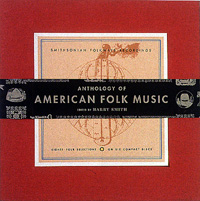 "Too jazzy for Brian Rust's American Dance Band Discography, too ethnic for his Jazz Records, and too ambivalent for Dick Spottswood's Ethnic Music on Records, "The Moonshiner's Dance" is both too full and too empty to be made sense of in an ordinary way."
"Too jazzy for Brian Rust's American Dance Band Discography, too ethnic for his Jazz Records, and too ambivalent for Dick Spottswood's Ethnic Music on Records, "The Moonshiner's Dance" is both too full and too empty to be made sense of in an ordinary way."1n 1997, Harry Smith released the "Anthology of American Folk Music" on Smithsonian Folkways. The literal, and for many also the figurative, centerpiece of which is the 1927 recording "The Moonshiner's Dance, Part One." When musician and science journal editor Kurt Gegenhuber first heard Moonshiner's he thought it sounded like like some kind of klezmerized, French-Canadian, red-hot Scanda-jazzian, beer-garden polka. All the Anthology's liner notes said about the tune is that it was recorded by Frank Cloutier and The Victoria Cafe Orchestra and that "The Victoria Cafe Orchestra ... does not appear in any jazz or dance band discography, but is assumed to have been from the Minnesota area." After 9 years obsessing over the anthology and 18 months dedicated to research the history of Moonshiners, Gegenhuber's written a fine essay for Zeek, a A Jewish Journal of Thought and Culture, detailing the history of the song complete with Prohibition gin-joints, Jewish gangsters, and ethnic novelty orchestras. You can check out Gegenhuber's essay at Zeek and listen to a sound clip on the Smithsonian Folkways site.


